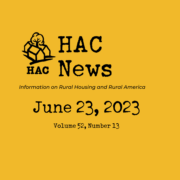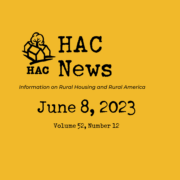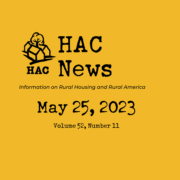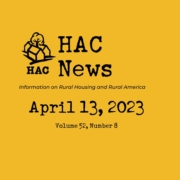HAC News: June 23, 2023
TOP STORIES
USDA funding bills approved by House and Senate committees
On June 14, the full House Appropriations Committee passed a FY24 funding bill for USDA. The committee did not change any of the dollar amounts for rural housing or community facilities programs that were adopted by the Agriculture Appropriations Subcommittee, but its report does show details that were not previously available. For example, Section 514/516 farmworker housing loans and grants, Section 504 repair grants, and Section 533 Housing Preservation Grants would all be reduced. Funding for the community facilities grants competition would fall from $25.3 million in FY23 to just under $3.6 million in FY24. Like the subcommittee, the full committee states that $1.607 billion will fully fund Section 521 Rental Assistance, without explaining why the amount is lower than the administration’s budget request. More information is posted on HAC’s website.
The Senate Appropriations Committee passed its version of the USDA bill on June 22. It would cut Section 502 direct loans from $1.25 billion this year to $850 million and would raise the program’s minimum interest rate to 2% instead of the current 1%. It would provide $1.6 billion for Rental Assistance and would decouple RA from Section 515 mortgages. HAC is reviewing the bill and will post more information online on June 23.
The House’s overall FY24 spending limits for non-defense discretionary programs, adopted by the House Appropriations Committee on June 15, are lower than the amounts provided in the Fiscal Responsibility Act, the debt limit compromise. Roll Call calculates that these limits (called 302(b) allocations), would decrease total funding for USDA by 30% below FY23 levels and for Transportation/HUD by 25%. The House versions of the FY24 appropriations bills may propose larger or smaller cuts in specific programs.
The House and the Senate committees have not yet released proposals for FY24 HUD funding and have not announced when they will begin to consider HUD bills.
Housing markets cool but costs remain high, says State of the Nation’s Housing report
The sharp interest rate hikes over the past year continue to impact housing markets and affordability for both homeowners and renters across the U.S., according to the State of the Nation’s Housing 2023 report from Harvard’s Joint Center for Housing Studies. First-time homebuying dropped sharply as housing costs remain well above pre-pandemic levels. Black and Hispanic homeownership rates were 28.6 and 25.8 percentage points below white homeownership rates in 2022. The number of cost-burdened renters hit a record high of 21.6 million households – about half of all renters – with 11.6 million of them spending over half of their income on housing. People continued to move into lower-cost, lower-density areas in 2022. The aging housing stock and climate change require attention as well, the authors write.
Apply for conference poster sessions by July 1
The deadline is July 1 for researchers and policymakers at all levels to apply to share their research and innovative ideas through a series of poster sessions at the 2023 National Rural Housing Conference, October 24-27 in Washington, DC. The research must be related to rural America and can be on housing or another field such as public health, community development, race and ethnicity, or creative placemaking. Posters will be reviewed and judged by a distinguished panel of rural experts. For more information, contact Manda LaPorte and Natasha Moodie, HAC.
Correction to June 8 HAC News
The last issue of the HAC News stated incorrectly that the debt ceiling compromise rescinded $2 million appropriated for preservation technical assistance for FY21. The Fiscal Responsibility Act did not rescind rental preservation TA funds. HAC apologizes for any confusion.
RuralSTAT
Homes in rural Appalachian counties are less likely to be single-unit buildings than homes in the rest of the rural U.S. (70.4% compared to 75.2%), and more likely to be mobile homes (19.5% compared to 11.4%). Vacancy rates are about the same (22.2% and 22.6%). Source: Appalachian Regional Commission tabulations of 2017-2021 American Community Survey. (Rural counties are defined as those outside of and not adjacent to a metro area.)
OPPORTUNITIES
Main Street Grants available for small cities
HUD’s HOPE VI Main Street Program provides grants to communities with populations under 50,000 to assist in the renovation of historic, traditional central business districts or “Main Street” areas by replacing unused, obsolete, commercial space in buildings with affordable housing units. The only eligible applicants are local governments whose jurisdiction includes the Main Street area. Nonprofit or for-profit entities and others can be subcontractors. The deadline is October 12. For more information, contact Susan Wilson, HUD, 202-402-4500.
CAPITOL HILL
House committee votes to cancel aid for disadvantaged farmers
At its June 14 markup of its FY24 USDA funding bill, the House Appropriations Committee adopted an amendment eliminating an Inflation Reduction Act program created to make payments to anyone who could show they experienced past discrimination in USDA farm lending programs. The program also includes funds to address land access (including heirs’ property) and funds outreach, education, and other aid. That IRA program replaced one created in the 2021 American Rescue Plan Act to aid socially disadvantaged farmers and ranchers because lawsuits had determined that USDA loan programs had discriminated against them. White farmers and ranchers sued, charging that the ARPA program itself was discriminatory.
Native American housing covered in Senate hearing
Witnesses and Senators discussed Indian Country’s housing needs and opportunities at a June 13 hearing on the State of Native American Housing convened by the Senate Banking Committee’s Housing Subcommittee.
REGULATIONS AND FEDERAL AGENCIES
HUD releases new inspection standards
The inspection standards notice for the National Standards for the Physical Inspection of Real Estate (NSPIRE) is the first of three subordinate publications that accompany the final NSPIRE rule published in May. NSPIRE provides for consistent property condition evaluations across multiple HUD programs. Notices on scoring and administrative matters are expected later this summer. HUD is developing training that will be posted on the NSPIRE website. For more information, email NSPIRE@hud.gov.
USDA systematizes appraisal assignment guidance for multifamily programs
Applicants to the Section 515 rental housing, Section 514/516 farmworker housing, and MPR preservation programs now do not need to request specific appraisal assignment guidance for each individual transaction. Instead, an owner can download (scroll down to “Quick Links”) the applicable appraisal assignment guidance, based on their specific situation, and provide the guidance to their appraiser prior to obtaining an appraisal. For more information, contact Jonathan Bell, USDA, jonathan.bell@usda.gov.
Comment deadline set for appraisal technology rule
Comments are due August 21 on a proposed rule by five federal regulatory agencies to establish standards for computer models that may incorporate discrimination in property appraisals.
Fair Market Rent calculation changes under consideration
Comments are due July 24 on a HUD proposal to redefine “recent movers” and to use private rent data in calculating FY24 FMRs. For more information, contact Adam Bibler, HUD, 202-402-6057.
USDA RD creates Tribal relations webpage
RD’s Tribal Relations Page offers information about funding opportunities, events, and publications. For more information, email aian@usda.gov.
HUD will establish working group on LGBTQI+ issues
A June 15 presidential Executive Order instructs several federal agencies to take specific actions to advance equality for lesbian, gay, bisexual, transgender, queer, and intersex people. HUD is tasked with creating a new Working Group on LGBTQI+ Homelessness and Housing Equity, which “shall lead an initiative that aims to prevent and address homelessness and housing instability among LGBTQI+ individuals, including youth, and households.”
Resources posted on homelessness and climate change disasters
Noting that people experiencing homelessness can face greater risks from natural disasters and have less ability to prepare for and recover from them, the U.S. Interagency Council on Homelessness has posted Homelessness and Climate Change: A Roundup of Resources for Communities Before, During, and After Disasters.
EVENTS
Rural energy funding webinar set for June 27
Rural Clean Energy Funding Opportunities Across Federal Agencies will be offered on June 27 by USDA, EPA, the Department of Energy, and other federal agencies. The webinar will introduce over a dozen clean energy funding opportunities for rural stakeholders.
Equitable Greenhouse Gas Reduction webinar series began June 22
In a set of webinars offered on Thursdays from June 22 through August 3, the Center for Impact Finance at the Carsey School of Public Policy and the Natural Resources Defense Council will make the case for how the EPA’s Greenhouse Gas Reduction Fund can deliver equitable greenhouse gas reduction in low-income and disadvantaged communities through traditional lending lines of business in key market sectors. Recordings will be available online.
PUBLICATIONS AND MEDIA
Housing costs still out of reach nationwide
Out of Reach 2023: The High Cost of Housing, the new edition of the National Low Income Housing Coalition’s yearly report, documents the gap between renters’ wages and the cost of rental housing for every state, metropolitan area, and county, as well as the portion of each state that is outside metropolitan areas. There is no state, metro area, or county where a full-time minimum-wage worker can afford a modest two-bedroom rental home within 30% of their income. The gap between wages and housing costs is largest for people of color, particularly women of color.
Chartbook shows changes and challenges in Appalachia
The Appalachian Region: A Data Overview from the 2017-2021 American Community Survey, published by the Appalachian Regional Commission, provides data and maps on a variety of topics including population, age, race/ethnicity, housing, education, internet access, employment, and more. Figures are listed for each of the region’s 13 states, for subregions, for county types, and for the Appalachian and non-Appalachian parts of each state (West Virginia is the only state entirely within the region).
Modular construction and local financing make homes affordable and expandable
Housing Innovation in Rural America, the last in a Nonprofit Quarterly set of articles titled Eradicating Rural Poverty: The Power of Cooperation Series, highlights the housing affordability challenges faced in rural America. Modular housing with community-based financing is an innovative approach to addressing these issues, as demonstrated with MiCASiTA. This model was pioneered by come dream. come build (cdcb) in the Rio Grande Valley, Tex. and is now being expanded to Pine Bluff, Ark. The modules are constructed off-site but locally, allowing for low-cost home construction that is affordable to lower-income families, who can add sections as they can afford them.
Connecticut begins baby bonds program
A National Community Reinvestment Coalition post discusses the potential implications of Connecticut’s new baby bond program in addressing wealth inequities. Starting on July 1, every baby born into a Medicaid eligible household in the state – disproportionately Black and Latino – will receive a $3,200 deposit into a trust. Those who are still Connecticut residents can redeem the funds between ages 18 and 30 for specific uses including purchasing a home.
HAC
National Rural Housing Conference set for October
Mark your calendars and save the date! HAC’s National Rural Housing Conference will be held October 24-27 in Washington, DC and online.
Need capital for your affordable housing project?
2HAC’s loan fund provides low interest rate loans to support single- and multifamily affordable housing projects for low-income rural residents throughout the U.S. and territories. Capital is available for all types of affordable and mixed-income housing projects, including preservation, new development, farmworker, senior and veteran housing. HAC loan funds can be used for pre-development, site acquisition, site development, construction/rehabilitation and permanent financing. Contact HAC’s loan fund staff at hacloanfund@ruralhome.org, 202-842-8600.
Please note: HAC is not able to offer loans to individuals or families. Borrowers must be nonprofit or for-profit organizations or government entities (including tribes).
Want to reprint a HAC News item?
Please credit the HAC News and provide a link to HAC’s website. Thank you!










